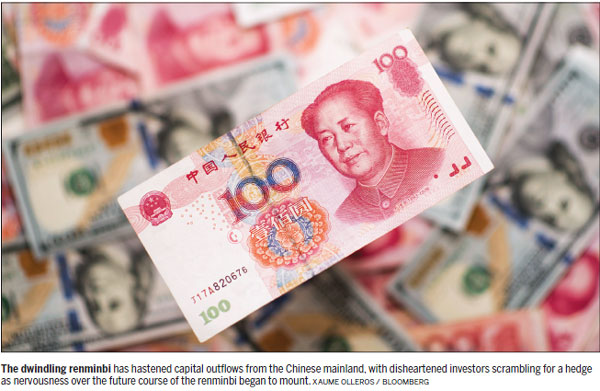Weakening yuan 'a bonus' for SAR
Updated: 2016-10-27 09:52
By lin wenjie in Hong Kong(HK Edition)
|
|||||||||
US bank sees big splash out in HK by mainland investors looking for a safe haven
Chinese mainland investors, unnerved by a sliding yuan, may be poised for a big splurge in Hong Kong as an investment safeguard, says Bank of America Merrill Lynch (BOAML).
High on their target list will be the property and insurance sectors, as well as cross-boundary funds.
The forecast by the US investment banking giant comes on the heels of the Chinese yuan's tumbling to six-year lows against the US dollar on Tuesday as the greenback accelerated on talk that US interest rates may be lifted by at least three times before the end of next year.
The dwindling yuan has hastened capital outflows from the mainland, with disheartened investors scrambling for a hedge as nervousness over the future course of the renminbi began to mount.
Mainland central-bank officials, however, have argued that there's no basis for persistent depreciation of the yuan - a view backed by global rating agency Fitch, which on Wednesday ruled out risks of a hard landing for the mainland economy, as well as any sharp depreciation of the Chinese currency. Fitch believes that US interest-rate increases would be at a slower pace than expected and that the yuan would be allowed to depreciate gradually.
In a research note on Wednesday, BOAML predicted that the value of capital outflows from the Chinese mainland is expected to climb to $113 billion in the third quarter of this year - up from $99 billion in the second quarter - while average outflows in 2017 are estimated to rise to $130 billion per quarter.
"Based on our expectations of the pace of capital outflows next year, the yuan's exchange rate to the US dollar is likely to weaken further to 7.25 by the end of 2017," the bank said.
According to BOAML's Property Monthly Monitor report, mainland funds are expected to roll into Hong Kong's housing sector as a shield against potential yuan devaluation risks, noting that mainland investors have made up a substantial portion of the SAR's property transactions this year, driven by a weakening yuan.
The number of mainland buyers in Hong Kong's primary property market soared to 25 percent in the second quarter of this year, and the percentage is even higher at 50 percent for luxury homes valued at more than HK$100 million, the report said, citing statistics from real estate agency Midland Realty.
BOAML also believes that the rapid growth in housing prices on the mainland, which has resulted in massive profit taking and stretched affordability in first-tier cities, has caused demand to spill over into Hong Kong.
"Hence, although we maintain a mild 5-percent correction in Hong Kong property prices next year, the risk seems skewed to the upside if liquidity remains abundant on the Chinese mainland."
The insurance business in Hong Kong represents another safe haven for mainland investors.
Hong Kong insurance giant AIA said that for the third quarter ended Aug 31 this year, the value of its new businesses went up 27 percent to $689 million - the group's highest ever quarterly performance.
"We've continued to benefit from a strong performance in the domestic Hong Kong market and a positive uplift in new business from mainland customers," AIA said.
The insurance giant's stock price has picked up 14 percent since the beginning of this year, outperforming the bench mark Hang Seng Index's 7.5-percent growth.
Qualified Domestic Investor Initiative (QDII) funds - onshore funds that are allowed to invest in overseas markets using designated quotas under the QDII program - and some funds linked to the Shanghai-Hong Kong Stock Connect are also among investors' favorite picks.
Meanwhile, the yuan ended a five-day losing streak on Wednesday, with the onshore yuan clawing back 92 basis points to close at 6.7686 per US dollar, while the offshore yuan was traded at 6.7798 to the greenback as at 4:30 pm in Hong Kong on Tuesday.
The People's Bank of China raised the yuan's daily reference rate by 39 basis points to 6.7705 per US dollar on Wednesday. The onshore exchange rate is allowed to rise or fall by 2 percent from the fixing rate each trading day.
cherrylin@chinadailyhk.com

(HK Edition 10/27/2016 page1)